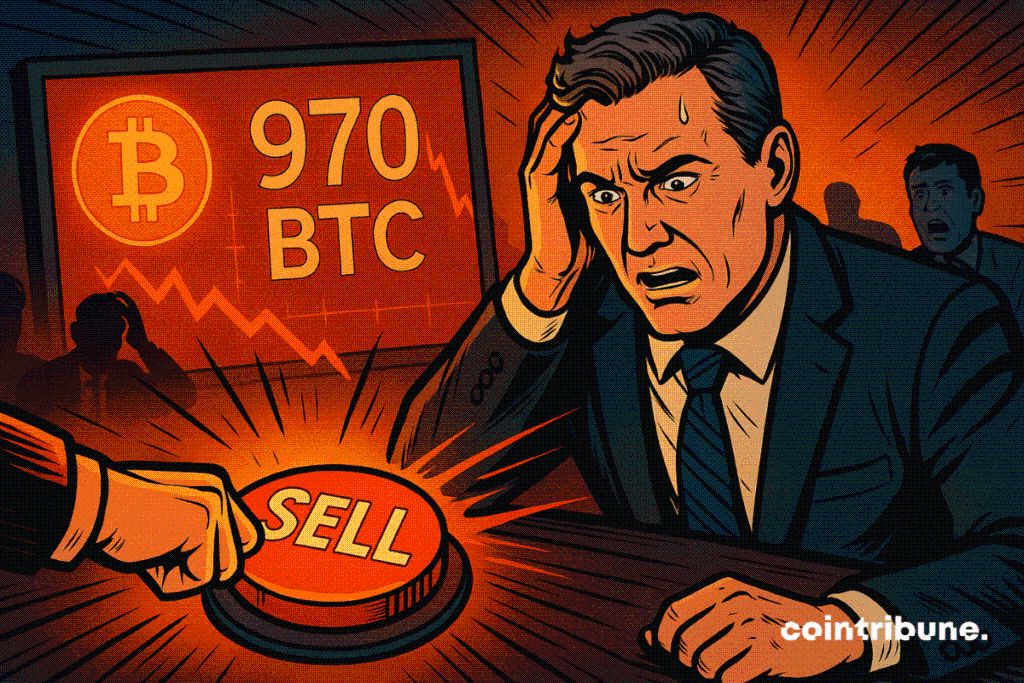Sequans Sells 970 Bitcoins, Unsettling the Markets
In recent days, the crypto market has darkened. Bitcoin is falling slowly but surely, flirting with 100,000 dollars. Should this be seen as a temporary pullback or the onset of a prolonged collapse? In this uncertain climate, Sequans’ decision to liquidate nearly 1,000 bitcoins is causing a stir. This is not a small player: this listed company had massively invested in BTC in recent months. Today, it is selling a third of its holdings. Start of panic or simple tactical adjustment? The crypto community is holding its breath.

In brief
- Sequans sold 970 bitcoins to reduce its debt from 189 million to 94.5 million.
- The firm keeps 2,264 bitcoins in reserve, used as collateral on its current debt.
- Its ranking in Bitcoin Treasuries drops from 29th to 33rd place worldwide.
- Bitcoin’s price was around 102,000 dollars at the time of the announced transaction.
A massive bitcoin sale to ease pressing debt
The news came through a press release: Sequans sold 970 BTC, reducing its convertible debt from $189M to $94.5M. This move aims to improve its debt/net asset value (NAV) ratio, dropping from 55% to 39%. In a declining crypto market, this Sequans maneuver draws attention.
The timing is all the more striking as bitcoin was trading around $102,000 at the moment of sale, its lowest level in four months.
CEO Georges Karam seeks to reassure:
Our Bitcoin treasury strategy and our deep conviction in Bitcoin remain unchanged. This transaction was a tactical decision aimed at unlocking shareholder value given current market conditions.
Yet despite this rhetoric, the sale represents 30% of its BTC reserves. A significant reduction that lowers its position in the ranking of biggest corporate holders from 29th to 33rd place. Enough to make some crypto investors doubt the solidity of the “bitcoin-treasury” model.
The “bitcoin-treasury” model tested on an unstable crypto market
Since June 2025, Sequans embarked on a MicroStrategy-inspired strategy: financing bitcoin purchases through debt and capital raises. The plan was ambitious, targeting 100,000 BTC by 2030. In July, the company added 755 BTC through placements. But since then, the winds have shifted.
The crypto market has cooled, capital raises dried up, stock premiums are collapsing. Indebted companies like Sequans suffer acutely from this reverse leverage effect. When BTC falls, the value of their treasury plunges, as does their borrowing capacity. Difficult, in this context, to maintain the trajectory.
A simple phrase, but one that reflects a concern shared by many observers: when a pioneer of the crypto strategy liquidates its holdings, perhaps the squeeze is tightening.
Declared convictions, assumed concessions: Sequans adjusts course
Despite appearances, Sequans is not giving up on its strategy. The remaining balance of 2,264 BTC will still serve as collateral for its debt. But it must be recognized that the 100,000 BTC target now seems more distant. The sentiment remains confident, but the action is more nuanced.
The company mentions a desire to increase its flexibility, revive its share buyback program (ADS), and issue preferred shares. In short, shifting from offensive accumulation to cautious management.
On the stock market side, SQNS shares have plummeted, losing 56% of their value since summer. Crypto investors watch this with a mix of concern and pragmatism. Many wonder: is the bitcoin strategy viable if the market reverses sustainably? Or should one hold firm and strengthen positions when fear dominates?
In summary: 5 notable data points
- 970 BTC sold by Sequans in early November;
- 2,264 BTC kept, still used as collateral;
- Debt/NAV ratio dropped from 55% to 39%;
- Bitcoin Treasuries position: from rank 29 to 33;
- Bitcoin price at writing: $101,927
As for the future of bitcoin, opinions diverge. Some still see a rocket ready to take off to $150,000 by the end of 2025. Others, like CryptoQuant analysts, believe that a fall to $72,000 remains perfectly plausible. Between celestial promises and risks of collapse, the balance is thin.
Disclaimer: The content of this article solely reflects the author's opinion and does not represent the platform in any capacity. This article is not intended to serve as a reference for making investment decisions.
You may also like
Prediction markets meet Tinder: Can you place bets on Warden's new product by simply swiping left or right?
No need for chart analysis, macro research, or even inputting the amount of funds.

Why does bitcoin only rise when the U.S. government reopens?
The US government shutdown has entered its 36th day, leading to a decline in global financial markets. The shutdown has prevented funds from being released from the Treasury General Account (TGA), draining market liquidity and triggering a liquidity crisis. Interbank lending rates have soared, while default rates on commercial real estate and auto loans have risen, increasing systemic risk. The market is divided over future trends: pessimists believe the liquidity shock will persist, while optimists expect a liquidity release after the shutdown ends. Summary generated by Mars AI. The accuracy and completeness of this summary are still being improved as the Mars AI model is updated.

Jensen Huang predicts: China will surpass the United States in the AI race
Nvidia CEO Jensen Huang stated bluntly that, thanks to advantages in electricity prices and regulation, China will win the AI race. He added that overly cautious and conservative regulation in Western countries such as the UK and the US will "hold them back."
OpenAI CFO: AI doesn’t need to cool down, the enthusiasm is far from enough!
As Wall Street grows increasingly concerned about an AI bubble burst, OpenAI's CFO is instead calling for "more enthusiasm." She also stated that going public is currently not in the company's plans.
